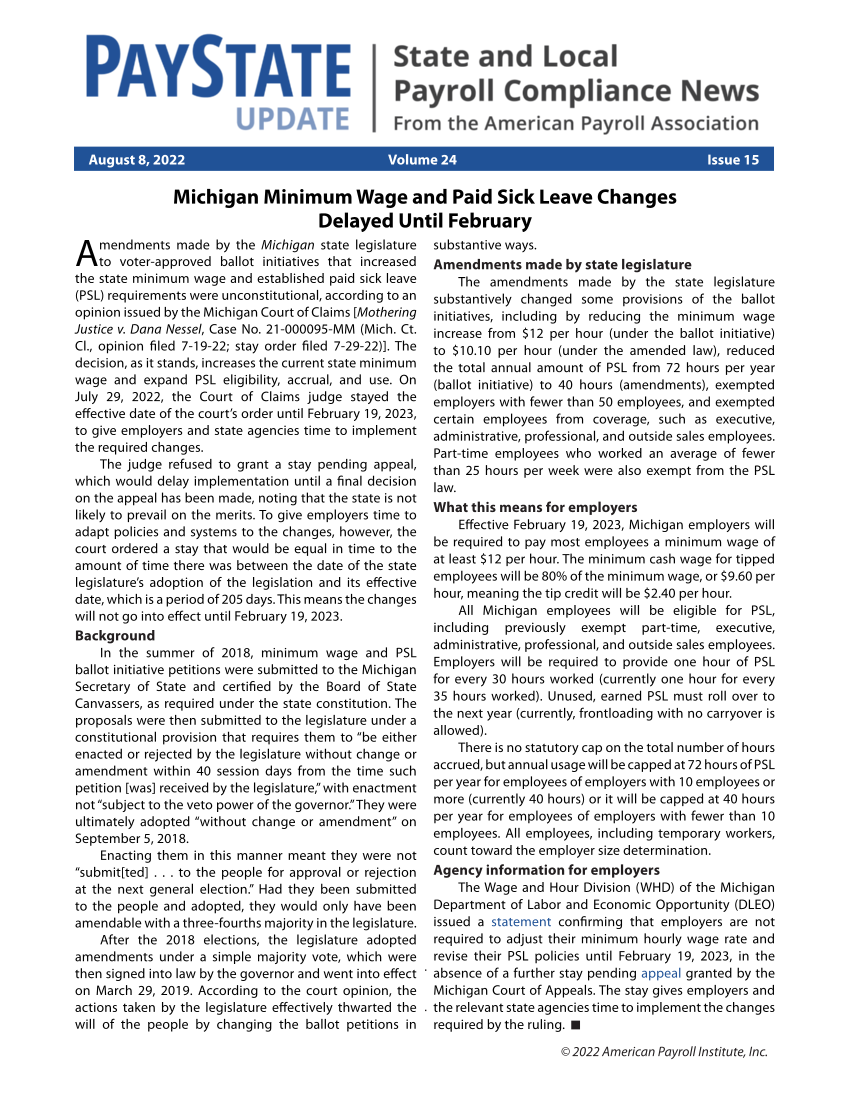© 2022 American Payroll Institute, Inc. Michigan Minimum Wage and Paid Sick Leave Changes Delayed Until February Amendments made by the Michigan state legislature to voter-approved ballot initiatives that increased the state minimum wage and established paid sick leave (PSL) requirements were unconstitutional, according to an opinion issued by the Michigan Court of Claims [Mothering Justice v. Dana Nessel, Case No. 21-000095-MM (Mich. Ct. Cl., opinion filed 7-19-22 stay order filed 7-29-22)]. The decision, as it stands, increases the current state minimum wage and expand PSL eligibility, accrual, and use. On July 29, 2022, the Court of Claims judge stayed the effective date of the court’s order until February 19, 2023, to give employers and state agencies time to implement the required changes. The judge refused to grant a stay pending appeal, which would delay implementation until a final decision on the appeal has been made, noting that the state is not likely to prevail on the merits. To give employers time to adapt policies and systems to the changes, however, the court ordered a stay that would be equal in time to the amount of time there was between the date of the state legislature’s adoption of the legislation and its effective date, which is a period of 205 days. This means the changes will not go into effect until February 19, 2023. Background In the summer of 2018, minimum wage and PSL ballot initiative petitions were submitted to the Michigan Secretary of State and certified by the Board of State Canvassers, as required under the state constitution. The proposals were then submitted to the legislature under a constitutional provision that requires them to “be either enacted or rejected by the legislature without change or amendment within 40 session days from the time such petition [was] received by the legislature,” with enactment not “subject to the veto power of the governor.” They were ultimately adopted “without change or amendment” on September 5, 2018. Enacting them in this manner meant they were not “submit[ted] . . . to the people for approval or rejection at the next general election.” Had they been submitted to the people and adopted, they would only have been amendable with a three-fourths majority in the legislature. After the 2018 elections, the legislature adopted amendments under a simple majority vote, which were then signed into law by the governor and went into effect on March 29, 2019. According to the court opinion, the actions taken by the legislature effectively thwarted the will of the people by changing the ballot petitions in substantive ways. Amendments made by state legislature The amendments made by the state legislature substantively changed some provisions of the ballot initiatives, including by reducing the minimum wage increase from $12 per hour (under the ballot initiative) to $10.10 per hour (under the amended law), reduced the total annual amount of PSL from 72 hours per year (ballot initiative) to 40 hours (amendments), exempted employers with fewer than 50 employees, and exempted certain employees from coverage, such as executive, administrative, professional, and outside sales employees. Part-time employees who worked an average of fewer than 25 hours per week were also exempt from the PSL law. What this means for employers Effective February 19, 2023, Michigan employers will be required to pay most employees a minimum wage of at least $12 per hour. The minimum cash wage for tipped employees will be 80% of the minimum wage, or $9.60 per hour, meaning the tip credit will be $2.40 per hour. All Michigan employees will be eligible for PSL, including previously exempt part-time, executive, administrative, professional, and outside sales employees. Employers will be required to provide one hour of PSL for every 30 hours worked (currently one hour for every 35 hours worked). Unused, earned PSL must roll over to the next year (currently, frontloading with no carryover is allowed). There is no statutory cap on the total number of hours accrued, but annual usage will be capped at 72 hours of PSL per year for employees of employers with 10 employees or more (currently 40 hours) or it will be capped at 40 hours per year for employees of employers with fewer than 10 employees. All employees, including temporary workers, count toward the employer size determination. Agency information for employers The Wage and Hour Division (WHD) of the Michigan Department of Labor and Economic Opportunity (DLEO) issued a statement confirming that employers are not required to adjust their minimum hourly wage rate and revise their PSL policies until February 19, 2023, in the absence of a further stay pending appeal granted by the Michigan Court of Appeals. The stay gives employers and the relevant state agencies time to implement the changes required by the ruling. August 8, 2022 Volume 24 Issue 15
Printed for: PayrollOrg Bookshelf © 2024 American Payroll Institute, Inc. All Rights reserved. From: PayrollOrg Digital Publications (bookshelf.payroll.org)






